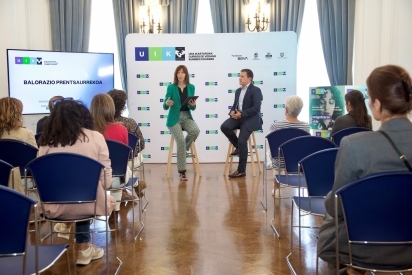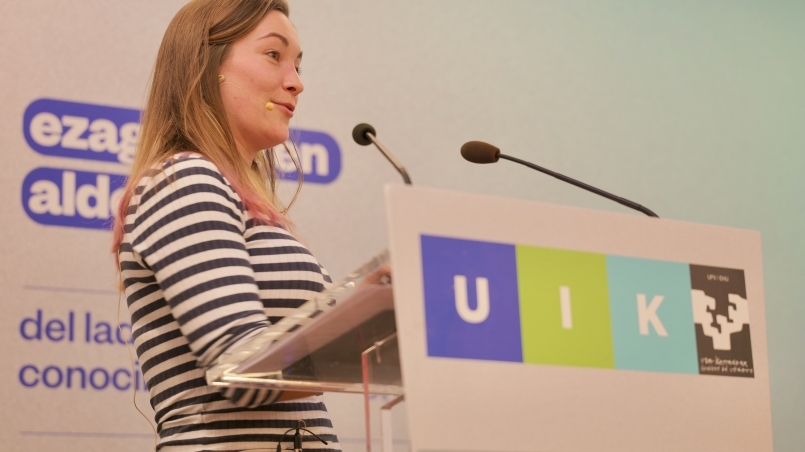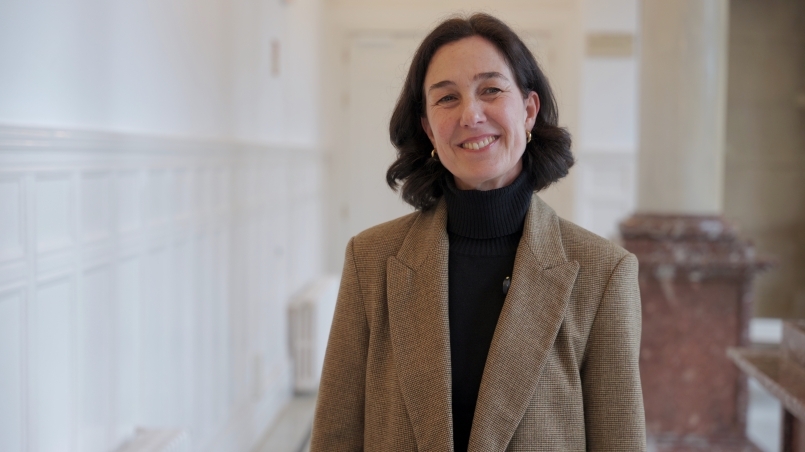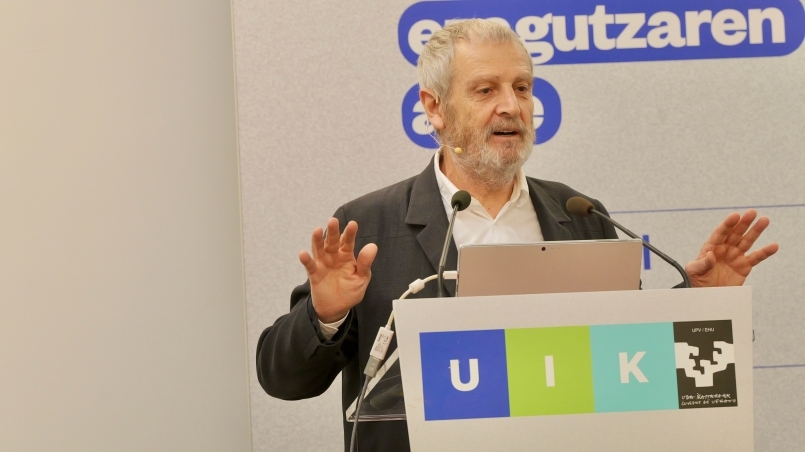UPV/EHU Summer Courses - more participative and international than ever
This 41st edition of the University of the Basque Country (UPV/EHU) Summer Courses stood out as a reflection of the diversification in the range of courses and activities run, as well as in the different ways of learning, online, face-to-face and/or hybrid, without losing their essence and the identifying trait behind them, and their constant commitment to updating and spreading knowledge.

This year we have taken the risk of trying out new ways of passing on knowledge on land and sea: Cross-Border Summer Courses – UNUM in Bayonne and “A university that looks at the sea” aboard the Saltillo, a success to be repeated.
We have been in touch with reality, both global and local: the invasion of Ukraine, the challenges to the EU, memory and transmission in villages, new forms of local governance and the Basque countryside, among others.
New brand UIK has enabled us to reach out to the largest numbers of international students yet recorded, with a majority of people from Argentina, Colombia, France, Germany, the Netherlands, the USA, the United Kingdom and Switzerland, among others.
We have seen how successful the new ways of learning are: online, face-to-face and/or hybrid, reaching more people and attracting a younger audience.
Thanks to the agreement with the Governance Department of the Provincial Council of Gipuzkoa, we have developed the TopaGune project with the holding of 4 participatory courses that promote new forms of participation and empowerment of citizens around education for sustainability, inclusion, and community action.
Also noteworthy is the first edition of the KulturGest cycle in collaboration with the Bilbao City Council, which will culminate in the holding of a congress after the three editions planned until 2024.
This 41st edition of the University of the Basque Country (UPV/EHU) Summer Courses stood out as a reflection of the diversification in the range of courses and activities run, as well as in the different ways of learning, online, face-to-face and/or hybrid, without losing their essence and the identifying trait behind them, and their constant commitment to updating and spreading knowledge.
The commitment of the UPV/EHU Summer Courses Foundation to making progress on the social challenges we face has once again structured a high-quality programme that has been held at its headquarters at the Miramar Palace in Donostia (99), and also with a leading role in Bilbao (22) and Gasteiz (6), as well as in other municipalities in the Basque Country, Navarre and Nouvelle-Aquitaine. There have been 138 Summer Courses and 203 activities in total, including activities open to the general public, workshops and online courses, totalling 14,695 people in 2022.
We are reaching a younger audience, and we will be continuing in this direction to foster transmission between generations and meeting places to encourage this. Foreign attendance was higher than ever, with people from Argentina, Colombia, France, Germany, the Netherlands, Switzerland, the USA, and the United Kingdom.
The recently-launched brand UIK has allowed dissemination and expansion in line with our new goals, aiming to open up even more to the world through live online courses, as well as developing new formulas such as Cross-Border Summer Courses – UNUM, a landmark held in Bayonne together with universities and leading public bodies in the NAEN Euroregion, the first edition of which attracted 734 people. The seaborne experience aboard the Saltillo, “A university that looks at the sea”, with students from the University of the Basque Country (UPV/EHU) and the University of Bordeaux, showed that we get about just as well at sea, with an unprecedented emotional and academic impact. The sessions led by the governance department of the Gipuzkoa provincial authority dealing with participation and reflection about forms of governance, which encouraged - among other things - empowerment and equality to eradicate violence against women, clearly showed that new forms of sharing are both welcome and necessary. All of them were experiences that generated an excellent response from students and are worth keeping up over time because of their unquestionable contribution to our society.
We saw the eight major challenges we identified, revolving around a deeper understanding of our changing reality, drew a highly positive response from students, including the international participants who, both online and in person, joined Summer Courses dealing with new forms of governance, equality, digitalisation, mental health, ageing and sustainability, not forgetting our classic fields such as education and Basque culture.
We cannot understand reality without observing and reflecting upon it in depth. For the same reason, with regard to governance, bearing in mind the need to create meeting places in which to resignify it, we dealt with the invasion of Ukraine, analysing the short and medium-term consequences of the new geopolitical scenario, with the president of the Spanish federal Council of the European Movement and professor of International Relations, Francisco Aldecoa, talking about Russian aggression in Ukraine as an attack on democracy, on shared values and on the European people, as well as the need to relaunch the EU. We pursued the theme to deal with the global challenges facing the European Union. As well as discussing the global, we maintained a local perspective with courses that also questioned the future of the small villages around us, focusing on inter-generational relations and the passing on of collective memory in the countryside.
To understand climate change and equip ourselves with tools to cope with it, a wide range of courses offered new points of view and recalled the powerful resources for change that have an impact on social welfare both directly and indirectly. Ana María Alonso, director of IGME-CSIC, the Spanish geological and mining institute, told us that humanity could not destroy the planet, pointing out that it will survive us however we treat it and stating that what is in danger is humanity. We discussed the transition to renewable energies, the possibilities offered by smart mobility, aware of the challenges posed by town planning and transferring this to the Basque countryside, also discussing its future. Antonio Turiel, specialist on the impact of the climate on the ocean and natural resources, reminded us that the energy transition on the table is not viable without a negative growth model, and that at no time has a transition model with an eye to climate change been put forward. All this within the framework of the DSF, Donostia Sustainability Forum, in which the BBVA Foundation, the Donostia City Council, the Basque Government through the Department of Economic Development, Environment and Sustainability and the Provincial Council of Gipuzkoa collaborate.
The feminisation of poverty and forced migrations have been present in Ihobe's schools of environmental communication and education for sustainability, where we have been reminded of the need for informed and trained people, equipped with a feminist perspective in order to understand better what we are facing and to provide appropriate solutions. Agenda 2030, a new social contract, deals with the need to reach new agreements to meet today's challenges, as Miguel Ángel Poiares Maduro pointed out very clearly.
We know that a society that does not treat its elderly as legal subjects cannot claim to be a fair society, as Inmaculada Sánchez, president of Federpen, reminded us in the course on care models to make older people feel at home. We analysed architecture to include the needs of this stage in life and Miguel Ángel Mira, architect and president of the Jubilares association, reminded us through the example of "cohousing" that until very recently people living environments of proximity established unwritten agreements for mutual care, related in turn with the future of long-term care.
Mental health has been one of the main topics in this edition. We have transcended social taboos and we have talked about what does have a name: suicide, the syndrome of women's discomfort, the necessary gender perspective to tackle sexual violence and the hidden violence that was hushed up until very recently and which is so close to us, as pointed out by Mercedes Bautista, Deputy Prosecutor of Gipuzkoa and expert on the subject, because as she said, identifying means recognising and healing.
We celebrated two important anniversaries for Basque culture: the 500th anniversary of Amaiur, building a place of memory through history and law, and the circumnavigation of Elkano. We have considered the necessary social activation to promote the Basque language and analysed the use of technology in the translation sector from its continuous transformation, with Itziar Cortés, head of translation technologies at Elhuyar, a foundation that is celebrating its 50th anniversary. The Eduardo Chillida School, 20 years after the artist's death, has kept his memory present through its second edition where nature, art and ethics have been the common thread.
In education we once again delved into models for educational and social/healthcare intervention with bilingual children suffering language development and learning disorders and, as paediatrician Belén Compains, co-director of the course, stated, bilingualism is actually something positive, on the contrary to what was believed up to now.
To culminate our 41st edition, we offered more than 50 interviews with experts conducted over the last three months in audiovisual format. These can be watched publicly, both on our website www.uik.eus and on our Youtube channel. We will continue to generate and share content throughout the year.
In the coming months, the Donostia Sustainability Forum will go on organising meetings with experts in the field of sustainability, including Caty Arévalo, co-founder of EFEVerde and winner of the Fundación BBVA prize for biodiversity conservation, as well as BBC environmental correspondent and winner of the Fundación BBVA's Biophilia environmental communication prize, Matt McGrath. We will be closely monitoring COP 27 to interpret its results and will again have the Ekoliderrak programme to promote young people's leadership of sustainability-based social change.
In response to demand from our students, both locally and internationally, we opted for longer online courses. At the request of the education ministry of El Salvador and promoted by charity Ayuda en Acción, the Spanish branch of ActionAid, in October we will be working on the possibilities offered by gamification, virtual reality and augmented reality in the classroom and in the educational sphere for the ministry's own staff. We will continue to hold the DIPC (Donostia International Physics Center) workshops, and other seminars, and we will host the 2nd International Congress on "Dual University Education in the European Higher Education Area" on 7 October.
All these autumn contents will be updated on the Foundation's website www.uik.eus.
The period for submitting proposals for the next edition of the summer courses in 2023 is from 2nd November to 2nd December and we would encourage different people in the academic research and social spheres to present proposals to go on reflecting and progressing with regard to the challenges to society that so concern us.
Once again, our immense gratitude for the unconditional support given by the institutions that make up the Organising Committee of the UPV/EHU Summer Courses: the BBVA Foundation, the Donostia City Council, the Provincial Council of Gipuzkoa and the Basque Government. And of course, thanks to the directors and speakers of the courses, the entities that collaborate in making each activity possible and to the students, to those who have always attended, and to the new additions as well. To the media, thank you, because you help to ensure that the reflections and learning from the UPV/EHU Summer Courses are disseminated beyond these meeting places.
Thank you for expanding the concept of knowledge and standing beside it.


